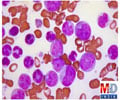Scientists have found that defects in the gene that encodes the XIAP protein result in a serious immune malfunction.

"Our results are an important step on the way to understanding the very serious – but fortunately rare – genetic immune disorder called X-linked lymphoproliferative syndrome type 2 (XLP2), which affects male children," says Associate Professor Mads Gyrd-Hansen from the The Novo Nordisk Foundation Center for Protein Research, and explains more about the disease:
"The gastro-intestinal system can be viewed as a long tube running through the body, absorbing nutrients and water. The contact surface between the intestinal system and the rest of the body is protected by an efficient immune barrier that confines the bacteria to the intestine. This barrier is not intact in XLP2 patients, who thus lack the necessary bulwark, so to say, between bacteria and body."
The new study published in Molecular Cell shows that genetic mutations found in patients with XLP2 specifically destroy XIAP's ability to attach the signalling protein ubiquitin to other proteins. The attachment process is vital for activating the immune system and therefore for survival.
Important knowledge for leukaemia research
While the results from the study published in Molecular Cell are first and foremost relevant for XLP2 patients, cancer researchers can also benefit from the new discoveries:
Mads Gyrd-Hansen and his colleagues at The Novo Nordisk Foundation Center for Protein Research have been collaborating for a good 18 months together with research groups in Germany, the UK and Australia, and the competencies of the individual groups have made it possible to rapidly achieve high-quality results quickly:
Source-Eurekalert
 MEDINDIA
MEDINDIA




 Email
Email





